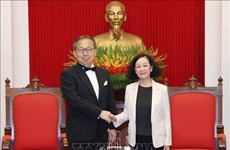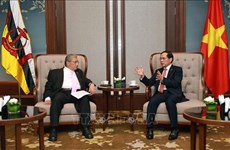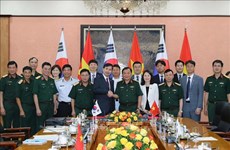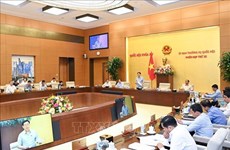President’s tour to Belarus, Russia fuels comprehensive cooperation
The official visit to Belarus and Russia by President Tran Dai Quang from June 26 to July 1 aims to boost Vietnam's cooperation with friends.
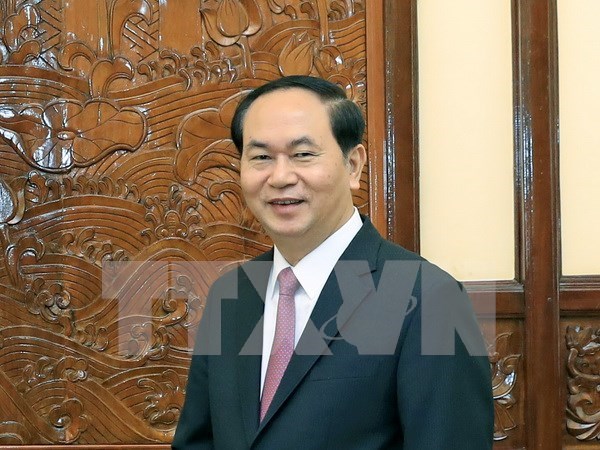 President Tran Dai Quang's visit to Belarus and Russia aims to boost Vietnam's cooperation with friends (Photo: VNA)
President Tran Dai Quang's visit to Belarus and Russia aims to boost Vietnam's cooperation with friends (Photo: VNA)In recent years relations between Vietnam and Russia have been developed via regular high-level delegation exchanges, thus boosting the bilateral comprehensive strategic partnership.
The two countries share similar viewpoints on many regional and global issues and support each other at international forums.
Bilateral economic and trade relations are thriving, with an inter-governmental committee for economic, trade, scientific and technological cooperation having been established in 1992.
Vietnam and Russia also have a business council to promote trade and investment.
Two-way trade reached 2.7 billion USD in 2016 and 1.37 billion USD in the first five months of 2017. Vietnam mainly exports mobile phones, garment-textile, farm produce, and seafood whilst importing oil and gas, iron and steel, fertiliser, machines and equipment.
Vietnam and the Eurasian Economic Union (EAEU) signed a bilateral free trade agreement on May 29, 2015, which took effect on October 5, 2016.
Russia now ranks 23rd out of 116 countries and territories investing in Vietnam with 118 projects worth 1.1 billion USD, focusing on energy, mining, processing-manufacturing industry and banking.
In recent years, Vietnam’s investment in Russia has rapidly increased from some 100 million USD in 2008 to 2.4 billion USD at present with 18 projects, concentrating on oil and gas, trade and agriculture.
Energy is considered an effective cooperative field that brings large revenues to Vietnam and Russia. Apart from the Vietsovpetro joint venture, the two countries have set up Rusvietpetro, Vietgazprom and Gazpromviet joint ventures to expand oil and gas cooperation in Vietnam, Russia and third countries.
Both nations have also agreed to cooperate in building and modernising energy works in Vietnam.
Additionally, the two sides have held cultural exchanges to increase mutual understanding and friendship between the two peoples, including annual Vietnam cultural days in Russia.
Russia continues to be one of the 10 top tourism markets in Vietnam with 430,000 Russian tourists visiting the Southeast Asian country in 2016 and 150,000 in the first quarter of 2017.
Based on effective cooperation in education and training, Russia has helped Vietnam in human resources, with more than 5,000 Vietnamese students studying in Russia.
Collaboration in security-defence has been enhanced, as has the science-technology partnership. The two countries have implemented nearly 60 research and technological transfer projects.
Both nations have also strengthened cooperation between localities via delegation exchanges and signing coordination agreements.
The Vietnamese community in Russia has made significant contributions to the host country.
Since 1991, Vietnam and Russia have signed more than 100 cooperation documents in all fields from economics, trade, investment, oil and gas, nuclear power and education-training to culture, science-technology and military.
Meanwhile, Vietnam and Belarus have sound traditional relations, with Belarus attaching much importance to enhancing ties in various fields.
People-to-people exchanges have been promoted between the two nations. They have cooperation mechanisms such as the inter-governmental Committee on Economic Trade and Scientific-Technical Cooperation and the inter-governmental Committee for Military Technical Cooperation.
Both sides support each other in regional and international forums like the United Nations and the Non-Aligned movement. The Eastern European country endorsed Vietnam to stand for the United Nations Economic and Social Council in 2016-2018 and the International Law Commission in 2017-2021.
Two-way trade in 2016 stood at 94.5 million USD and at 37.7 million USD in the first quarter of 2017. Vietnam exports seafood, wood-based products, garments, footwear, rice, natural rubber, cashew, tea, pharmaceutical products and computers to Belarus, while importing fertiliser, machines, equipment, automobile spare parts, trucks and chemicals.
The two sides have enjoyed close cooperation in the framework of the EAEU-Vietnam free trade agreement.
Belarus has helped Vietnam train various officials and experts. Currently, there are some 70 Vietnamese students studying in the country.
Security and defence cooperation has been maintained via the inter-governmental Committee for Military Technical Cooperation. Meanwhile, science and technology collaboration has grown with numerous projects.
Cultural exchanges have been held in both countries from 2014-2017. The number of Belarusian tourists to Vietnam has increased significantly thanks to the country’s visa exemption policy for Belarusian citizens from 2015. Belarus allowed visa-free entry for Vietnamese people from February 12, 2017.
The two countries also have prospects in labour cooperation. Contracts have been signed between Vietnamese and Belarusian businesses to bring Vietnamese workers to build an entertainment zone in Minsk city.
In addition, collaboration between localities has been sped up with numerous cooperation agreements inked between Hanoi and Minsk, Da Nang city and Grodno city, Ho Chi Minh City and Minsk city and Quang Ninh province and Minsk city and Grodno city.
Some 500-600 Vietnamese people live and work in Belarus. They have enjoyed favourable conditions to reside and do business in the nation.
The visit to Belarus and Russia by President Tran Dai Quang is a significant event, affirming that Vietnam treasures relations with Russia and Belarus. It will also create momentum to further cooperation relations in various fields.
The two sides will discuss and evaluate past bilateral cooperation activities and seek ways to further collaboration. International issues of mutual interests will be also on the table, assuring that both sides continue to support each other at regional and international forums.-VNA










